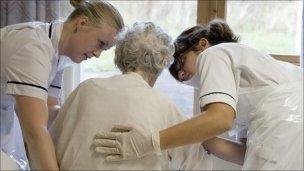NHS 'must improve care of elderly surgery patients'
- Published

The elderly population is set to double in 25 years
Hospitals must improve their care of elderly patients undergoing surgery, an independent review has concluded.
Pain management, nutrition and delays were all highlighted as problems by experts from the National Confidential Enquiry into Patient Outcome and Death.
Overall, just over a third of patients were judged to have had good treatment.
The review body analysed the care given to 820 people aged over 80 who died within 30 days of having surgery in England, Wales and Northern Ireland.
Many of these were patients admitted as emergencies following fractures or internal bleeding.
'Wake-up call'
Researchers used case notes and surveys of doctors to assess the quality of the treatment.
They concluded the care given to 38% of patients could be classed as good. More than half got care which had "room for improvement", while 6% received treatment that was less than satisfactory.
Mike Weston says his mother Florence suffered "appalling care" when she fractured her hip.
One of the major problems was a lack of access to expert elderly care doctors - over two thirds of patients were not reviewed by such specialists.
A fifth of patients also experienced significant delays between admission and their operation, while pain management was lacking in many cases.
Report author Dr Kathy Wilkinson said: "I hope our report is a wake-up call."
There are about 1.25m people over the age of 85 in the UK - a figure which is set to double over the next 25 years.
Kieran Mullan from the Patients Association described the problem as a "national disgrace".
"We continue to be extremely concerned about the care of elderly patients in hospital. As a society, not just a health service, we should all look after our must vulnerable."
Michelle Mitchell, of the Age UK charity, said: "This report is a stark reminder that far too often older people in the UK receive second or even third rate care in hospital, condemning many of them to an early death."
Jo Webber, of the NHS Confederation, which represents hospitals, said the care of elderly surgery patients was often "complex".
But she added: "There is absolutely no excuse for poor care, regardless of the age of the person involved. "
- Published2 September 2010
- Published21 June 2010